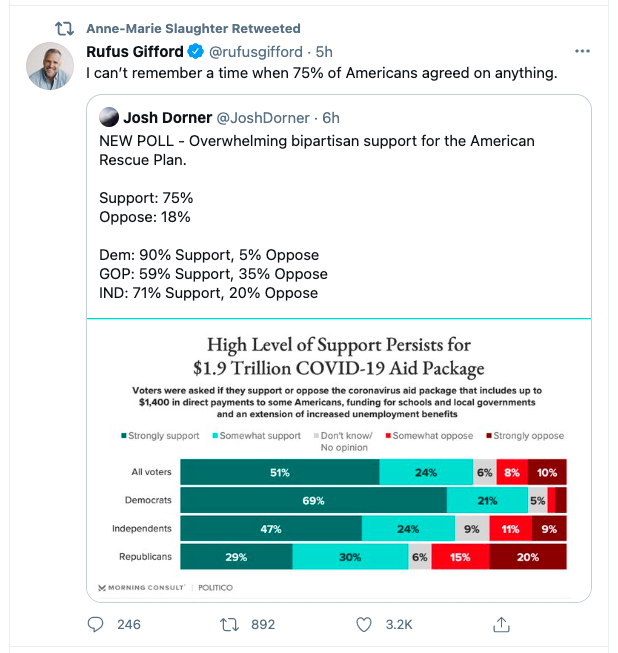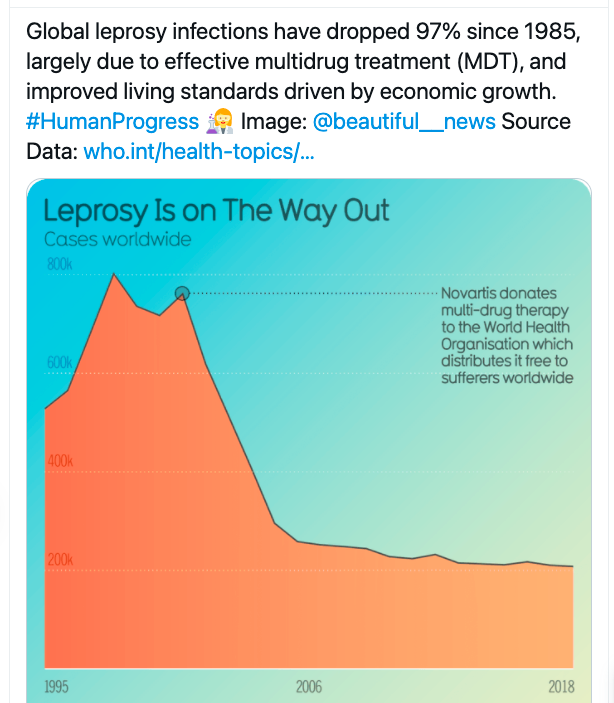Volcanoes are erupting in The Philippines, but on-fire Australia received some welcome rain. The Iran war cries have been called off and The Donald’s military powers are about to be hamstrung by the Senate. Meanwhile, his impeachment trial is starting, and we’re all on Twitter for a front-row seat.
When Have 75% of Americans Agreed on Anything?
The just-passed COVID relief bill becomes the third most popular piece of major legislation in the past 30 years. We discuss the unifying American Rescue Plan, global vaccine distribution, and more in this week's newsletter.
This is an extract from our now-weekly newsletter, What Could Go Right? Sign up here to receive it in your inbox every Thursday at 6am. You can read the full newsletter here.
One of the not-unreasonable fears at the start of the pandemic was that it would devastate low-income countries in Africa and Asia. The World Health Organization (WHO) predicted that malaria deaths in sub-Saharan Africa, for instance, could double to 769,000 due to health service disruptions like the deliveries of nets and medication. In April last year, WHO urged countries to move quickly to save lives.
And . . . they did.
While COVID has indeed stalled progress on many global health fronts, including malaria, “I am delighted to say that the predicted doubling in malaria deaths was averted,” said Kenya’s President and chair of The African Leaders Malaria Alliance Uhuru Kenyatta in a press release last month. As for the anticipated disruptions, more antimalarial medicines were distributed to children in high-risk regions than in previous years, and under COVID-safe precautions to boot.
The New York Times and The New Yorker have both tried to solve the mystery of low-income countries’ low COVID death tolls recently; there was also a nice piece in The Atlantic about the tiny, poor Himalayan nation of Bhutan, whose COVID death count stands, a year into the pandemic, at one.
Now the international COVID vaccine push is beginning as well. The Gates Foundation pointed out in their latest newsletter that the time delay between the first doses that arrived in Ghana and Cote d’Ivoire, the first beneficiaries of COVAX, and the first doses administered in the UK, was 11 weeks. (For comparison, the vaccine for pneumonia took 15 years.) Both since rich countries have bought one billion more doses than they need and since an outbreak anywhere in the world could lead to COVID Pandemic Part 2, several of our Members have been a part of the global vaccine distribution conversation. Most recently, medical ethicist Ezekiel J. Emanuel has asked—and answered—the question of when it’s ethically obligatory for countries to release doses. It’s at the point when deaths directly and indirectly caused by COVID begin to resemble those from influenza, he says.
On the home front, a fair number of our Members are excited about the just-passed COVID relief bill, the third most popular piece of major legislation in the past 30 years. It’s behind only the 1993 Brady Bill, which mandated federal background checks and waiting periods for gun purchases, and the 2007 minimum wage hike (we’re due for one of those, by the way, and the idea has lots of bipartisan support). President Biden ran on unity, and unity he is delivering:

Chances are, if you’re a parent, you’re looking forward to the new child tax credit, which the Center on Poverty and Social Policy at Columbia has predicted will more than halve the child poverty rate. And we have to say, especially because we’ve picked on Axios a couple times recently, that we enjoyed their summary of the package as a whole: “The bill has already upended the conventional wisdom about what’s possible.”
Speaking of what’s possible, today is your last chance to register for our event at 8pm ET, Maybe We’re Not F*cked: Moving the Climate Conversation Forward. Even the King of Climate Doomsaying, David Wallace-Wells, thinks “the conditions of possibility have really changed,” as TPN Member Yancey Strickler put it in his interview with the writer. “The landscape used to look tilted against decarbonization. Now it’s tilted toward it.” Read Strickler’s interview with Wells here. And to add one more piece of positive private-sector climate news from our list last week, Volvo will be fully electric by 2030.

From us: You’ve got just a few hours to register for today’s event, Maybe We’re Not F*cked: Moving the Climate Conversation Forward. And we have a last-minute surprise! Founding Director of the Global Center on Energy at Columbia University, Jason E. Bordoff, will be joining us.


